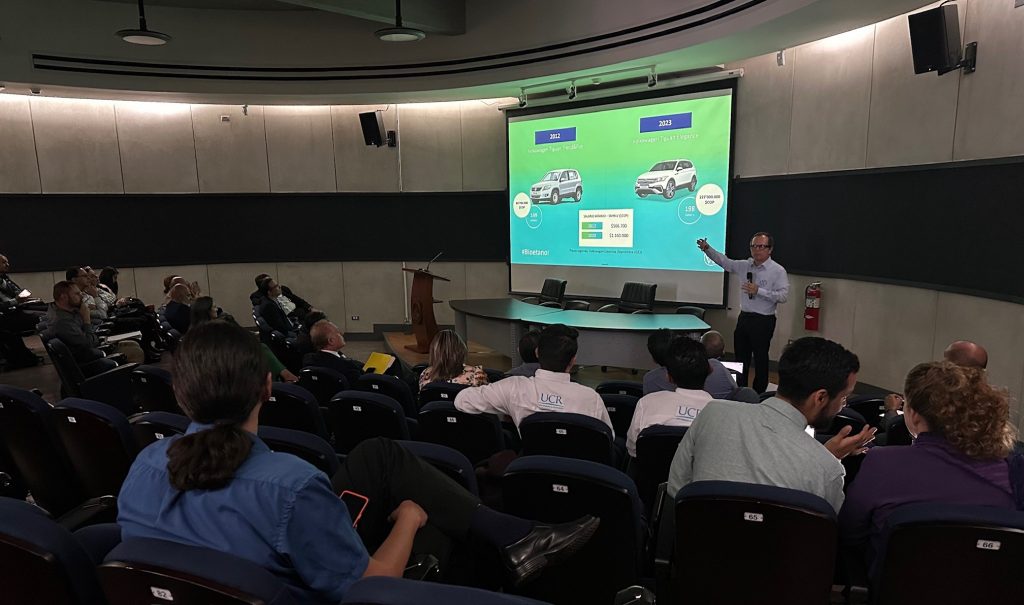As part of the U.S. Grains Council’s (USGC’s) strategy to support the initiation of the ethanol-gasoline blending program in Costa Rica, USGC Regional Ethanol Consultant Federico Salcedo participated in a technical workshop in San Jose, Costa Rica, that focused on ethanol and vehicle compatibility.
“The significance of this workshop, held at the behest of the Costa Rican authorities, is that it opened a constructive dialogue among key stakeholders. The automotive sector, one of the sectors that had initially opposed the ethanol-gasoline blending program, has now shown a positive shift primarily due to the dissemination of accurate information about the negligible negative impact of ethanol on vehicle performance,” said Salcedo.
The workshop was hosted by the Ministry of Environment and Energy in Costa Rica (MINAE), the University of Costa Rica and the Inter-American Institute for Cooperation and Agriculture (IICA). In addition to Salcedo, speakers at the workshop included the Vice Minister of Energy of Costa Rica Ronny Rodriguez; Brian West of West Energy and Environment Associates; Juan Felipe Bedoya, CEO of Porsche/VW Colombia; and Roberto Urcuyo of the University of Costa Rica.
“During the workshop, international experiences on ethanol use and vehicle performance were presented, including the cases of the United States and Colombia, as well as presentations on the environmental, economic and technical benefits of blending ethanol with gasoline, especially considering the conditions of the Costa Rican and Latin American vehicle fleet,” said Salcedo.
Rodriguez, who spoke about the Government of Costa Rica’s plan to begin blending ethanol with gasoline, outlined the benefits and motivations for the country to start using the biofuel.
“Costa Rica is opting for a 10 percent ethanol blend in gasoline, initially oriented to premium gasoline, which accounts for 54 percent of the fuel consumption so that this 10 percent blend is the equivalent of taking more than 30,000 vehicles off the road,” Rodriguez said.
Rodriguez also mentioned that progress has been made on a regional biofuels standard that, in addition to Costa Rica, covers the other countries that are part of the Central American Integration System (SICA).
Brian West of West Energy and Environment Associates shared with workshop attendees the U.S. experience with ethanol blends, including the Department of Energy Mid-Level Ethanol Blends Program, which contributed to showing how the U.S. safely moved from E10 to E15, as well as his more recent high-octane fuels work for United States corn growers.
Costa Rica has announced the initiation of 10 percent ethanol blends in premium gasoline by December 2024, with the plan to expand to all gasoline by 2025. During the event, Salcedo highlighted the importance and relevance of ethanol use for a country like Costa Rica that has ambitious greenhouse gas emission (GHG) reduction goals and, at the same time, is a net importer of fuels, and reiterated the Council’s interest and support to Central American countries that are currently initiating or exploring the start of a blending program.
“Following the workshop, several representatives and Costa Rican Vehicle Association members expressed their satisfaction with the information received and their increased understanding of the ethanol-to-gasoline program,” Salcedo said.
About The U.S. Grains Council
The U.S. Grains Council develops export markets for U.S. barley, corn, sorghum and related products including distiller’s dried grains with solubles (DDGS) and ethanol. With full-time presence in 28 locations, the Council operates programs in more than 50 countries and the European Union. The Council believes exports are vital to global economic development and to U.S. agriculture’s profitability. Detailed information about the Council and its programs is online at www.grains.org.

